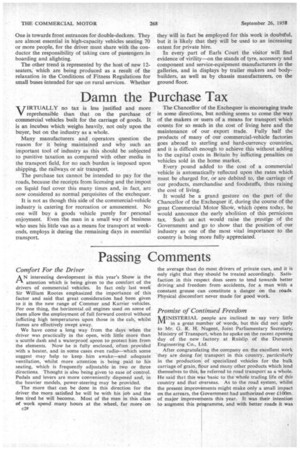Damn the Purchase Tax
Page 94

If you've noticed an error in this article please click here to report it so we can fix it.
-VIRTUALLY no tax is less justified and more V reprehensible than that on the purchase of commercial vehicles built for the carriage of goods. It is an incubus which weighs heavily, not only upon the buyer, but on the industry as a whole.
Many manufacturers and operators question the reason for it being maintained and why such an important tool of industry as this should be subjected to punitive taxation as compared with other media in the transport field, for no such burden is imposed upon shipping, the railways or air transport.
The purchase tax cannot be intended to pay for the roads, because the receipts from licensing and the impost on liquid fuel cover this many times and, in fact, are now considered as normal perquisites of the exchequer.
It is not as though this side of the commercial-vehicle industry is catering for recreation or amusement. No one will buy a goods vehicle purely for personal enjoyment. Even the man in a small way of business who uses his little van as a means for transport at weekends, employs it during the remaining days in essential transport. The Chancellor of the Exchequer is encouraging trade in some directions, but nothing seems to come the way of the makers or users of a means for transport which counts for so much in the cost of living here and the maintenance of our export trade. Fully half the products of many of our commercial-vehicle factories goes abroad to sterling and hard-currency countries, and it is difficult enough to achieve this without adding to the capital costs in Britain by inflicting penalties on vehicles sold in the home market.
Every pound added to the cost of a commercial vehicle is automatically reflected upon the rates which must be charged for, or are debited to, the carriage of our products, merchandise and foodstuffs, thus raising the cost of living.
It would be a grand gesture on the part of the Chancellor of the Exchequer if, during the course of the great Commercial Motor ShoW, which opens today, he would announce the early abolition of this pernicious tax. Such an act would raise the prestige of the Government and go to show that the position of our industry as one of the most vital importance to the country is being more fully appreciated.












































































































































































































































































































































